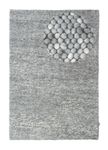
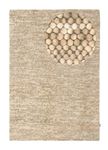
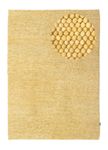
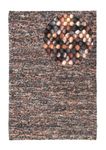
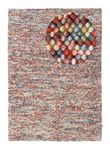





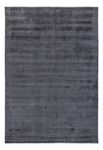
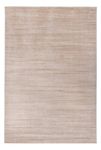
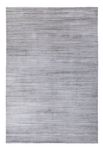

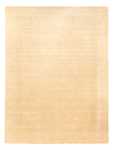
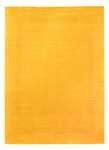

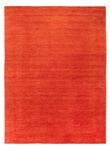



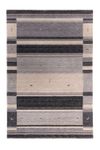






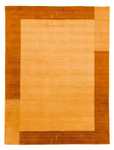


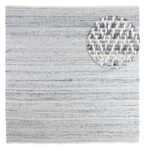
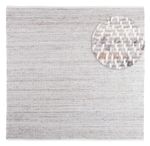
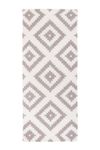
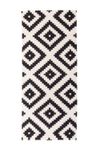









A wool rug brings stunning natural beauty to any home, combining wool and virgin wool with charming designs to enhance any interior style. The raw material is obtained from the fleece of sheep and goats, ancient fibers that have been appreciated for thousands of years. The unique properties of these materials are able to give rooms a welcoming aesthetic that radiates warmth and comfort.
But that's not all. Wool is also water-repellent and heat-regulating, which is obvious when you consider where it comes from. When it's hot, it releases heat; when it's cold, it retains heat. And of course, wool is soft, easy to dye, and can be used in a variety of ways.
Wool rugs are eye-catchers and enjoy great popularity. They improve the room climate and acoustics and keep your feet warm. No matter whether you prefer it smooth or soft – there is something for every taste! They are robust and easy to care for and fit easily into an existing style of living. The nature of the rug depends mainly on the “processing method” of the wool fibers.
These techniques are most commonly used:
Frequency: very common, especially in high-quality wool rugs.
Execution: This technique is mainly used for the production of hand-knotted rugs, as found in Oriental and Persian rugs. Each individual wool thread is manually knotted around two warp threads, creating a dense and durable surface. This results in exceptionally durable rugs, which often feature elaborate patterns and designs. The density of the knots determines the fineness and durability of the rug.
Ideal for: luxurious living areas, representative rooms, and areas with medium to high traffic.
Frequency: very common in flat-woven rugs and runners.
Construction: This traditional technique involves manually interweavingthe warp and weft threads on a loom. This technique is used to create a flat, dense woven rug, often with geometric or traditional patterns. A handwoven wool rug is usually more dense and flat in structure than a knotted one, yet still offers great durability.
Ideal for: living and dining areas, hallways, and high-traffic areas where durability and easy maintenance are important.
Frequency: Widely used, especially for decorative and ethnic rugs.
Style: Flat-woven rugs, such as kilims and sumaks, are rugs without piles. The woolen threads are woven in a minimalist, flat structure, often with reversible patterns (i.e., identical and usable on both sides of the rug). These rugs are lightweight, easy to transport, and highly durable. They are especially known for their traditional designs, which consist of geometric shapes and patterns.
Ideal for: living and dining rooms, hallways, wall-to-wall installations, or decorative accents.
Frequency: Common for modern, custom-designed rugs.
Construction: Hand-tufted describes a rug in which the yarns are shot into a pre-drawn pattern on a backing material using a special tufting gun. The back of the rug is then glued to a scrim to hold the yarns in place. This method enables quick and cost-effective production, as well as the creation of complex patterns and designs with different pile heights (high-low effect).
Ideal for: Bespoke rugs, creative and modern living spaces, and rooms where design flexibility is required.
Frequency: Relatively common, especially in hard-wearing rugs.
Construction: This technique involves leaving the pile uncut, and creating loops. These loops provide a robust and textured surface that is highly resistant to wear. Loop-pile rugs are particularly easy to clean and show less signs of wear, making them ideal for high-traffic areas.
Ideal for: hallways, entryways, stairs, offices, or anywhere high traffic is required.
Frequency: Less common but popular for luxurious rugs.
Style: This technique creates a velvety, soft surface because the wool threads are processed so that they stand upright. Shag pile rugs are particularly soft to the touch and look luxurious. However, they are less durable than other techniques and are better suited for less high-traffic areas.
Ideal for: bedrooms, living rooms, and representative rooms where comfort and elegance are paramount.
If you want to buy a wool rug, you want it to match your existing decor. Whether woven, fringed, handmade, mottled, short-pile, or high-pile rug; the natural fiber has exquisite properties that people like to adopt.
To make this as easy as possible, Morgenland offers a wide selection of facets and combinations of all colors, for “your” individual “way of living.” Colorful wool rugs bring texture and life into the home. But even in solid colors, as often found in a “Gabbeh,” wool rugs are particularly easy to integrate.
Do you like it puristic? A wool rug, kept neutral, for example in beige, gives simple elegance and fits perfectly with Scandinavian-inspired furniture. Fortunately, natural colors are not only cozy, but also make your room appear brighter and larger at the same time.
Wool rugs are timeless. A pure new wool rug under the coffee table, for example in white or beige, or a robust hand-woven rug in the dining area, will certainly guarantee a sense of well-being. And if the dining table should be round, then why not choose a matching round wool rug? Either way, only the best for your guests.
For the most private of all retreats, the character of a wool rug is particularly suitable; depending on the size of the bed, perhaps in a 200x300 cm version. Because wool brings a very unique, but always pleasantly cozy aura to the interior; visually and haptically! The shimmering of the fibers when illuminated at night is just as appealing as the caressing of the senses when waking up in the morning.
If your floor is already doing a good job and you don't want to get into a conflict situation, runners made of wool or virgin wool are the perfect compromise. These can be placed wonderfully at the sides and/or at the foot of the bed. This way you get the best of both worlds.
A children's rug should be cuddly, inviting, and elastic to withstand the temperament of little ones. Ideally, it should be able to store heat well and be easy to clean. In this demanding environment, a wool rug is particularly suitable because it has all these qualities.
Particularly “hand woven wool rugs can take a lot and last a long time. In addition, wool can be processed without any harmful substances and gives your little ones the necessary grip to stand securely on their own two feet right from the start.
At Morgenland, you can buy wool rugs online and choose the shape that suits your room from the comfort of your own home.
Even if most rooms are rectangular, you can accentuate certain areas with a cozy round rug. This also works very well in hallways, with a correspondingly sized rug runner.
Wool rugs are available in a wide variety of sizes. To get a feel for what might work for you, here is the range of formats you will find at Morgenland:
from 60 x 40 cm (and smaller) to 600 x 400 cm (and larger) - for rectangular rugs
from 80 x 80 cm (and smaller) to 400 x 400 cm (and larger) - for square rugs
from 180 x 120 cm (and smaller) to 350 x 250 cm (and larger) - for oval rugs
from 200 cm to over 400 cm in length - for runners
and a wide range of “special shapes” and “custom-made” products.
A wool rug is a loyal companion. If, however, something should unexpectedly go wrong, it just takes a little attention to ensure that your rug stays in top form.
Depending on the type and severity of the contamination, there are some simple methods for remedying a mishap:
You can easily keep wool rugs free of the worst of the mess by vacuuming them weekly. They are, thanks to sheep, naturally dirt-repellent. Just make sure you use a nozzle without a rotating brush to protect the material.
It's best to remove stains immediately. Gently dab up spilled liquids with a clean, dry cloth. If necessary, use lukewarm water and a mild detergent (e.g. wool detergent) to make a soap solution.
Turn the rug regularly to ensure even wear and minimize potential color changes caused by sunlight.
A professional rug cleaning every few years helps remove deep-seated dirt and dust and extend the rug's lifespan.
As a general rule, cleaning wool rugs is straightforward.
To get a rough idea of the prices of wool rugs, you can compare them with this table:
Size (in cm) | Price example | Notes |
120 x 170 | 150 - 200 € | Ideal for small rooms or as a highlight |
160 x 230 | 250 - 400 € | Standard size for the living room |
200 x 300 | 400 - 600 € | Large, suitable for larger rooms |
250 x 350 | 600 - 800 € | Luxurious, fills the room |
Prices may vary depending on the brand, quality, and design.
A wool rug brings natural sophistication and quality to your home. Its durability and resilience make it an ideal choice for demanding living spaces. Wool is sustainable, stain-resistant, sound-absorbing, and fire-retardant. Its luxurious surface sets stylish accents and enriches any environment.
Buying a rug online also has many advantages. You can conveniently choose from a huge selection of wool rugs of the best quality, without having to trawl through discount stores and rummage through discount goods. You can choose from a wide range of payment service providers, get the goods delivered, benefit from free return shipping, and take advantage of the 31-day right of return.
“Rug-heart, what more could you want?”
Regular vacuuming is important. Stains should be dealt with immediately: gently dab the stain with a clean, damp cloth and use a mild wool detergent in a soap solution to treat stubborn stains.
It is not recommended to fully wash wool rugs, as too much moisture can damage the wool. Instead, stains should be treated spot-on or professionally cleaned.
Professional cleaning every 1-2 years is ideal to remove ingrained dirt and maintain the rug.
Yes, like many natural materials, direct sunlight can cause fading of colors. It is advisable to turn the rug regularly to ensure even wear.
Yes, wool rugs are often a good choice for allergy sufferers. Wool is hypoallergenic because it attracts and binds dust and pollen instead of releasing them into the air. Regular vacuuming helps remove these particles.
Yes, wool rugs are suitable for households with pets as they are durable and easy to clean. However, make sure you use a suitable quality and treat stains quickly to ensure a long lifespan.
With proper care and regular cleaning, a wool rug can last for many years, often even decades. Wool is a very durable material that remains resilient even with heavy use.
Yes, especially on smooth surfaces, a wool rug can slip. Using a non-slip underlay or rug mat will help keep it in place and prevent accidents.